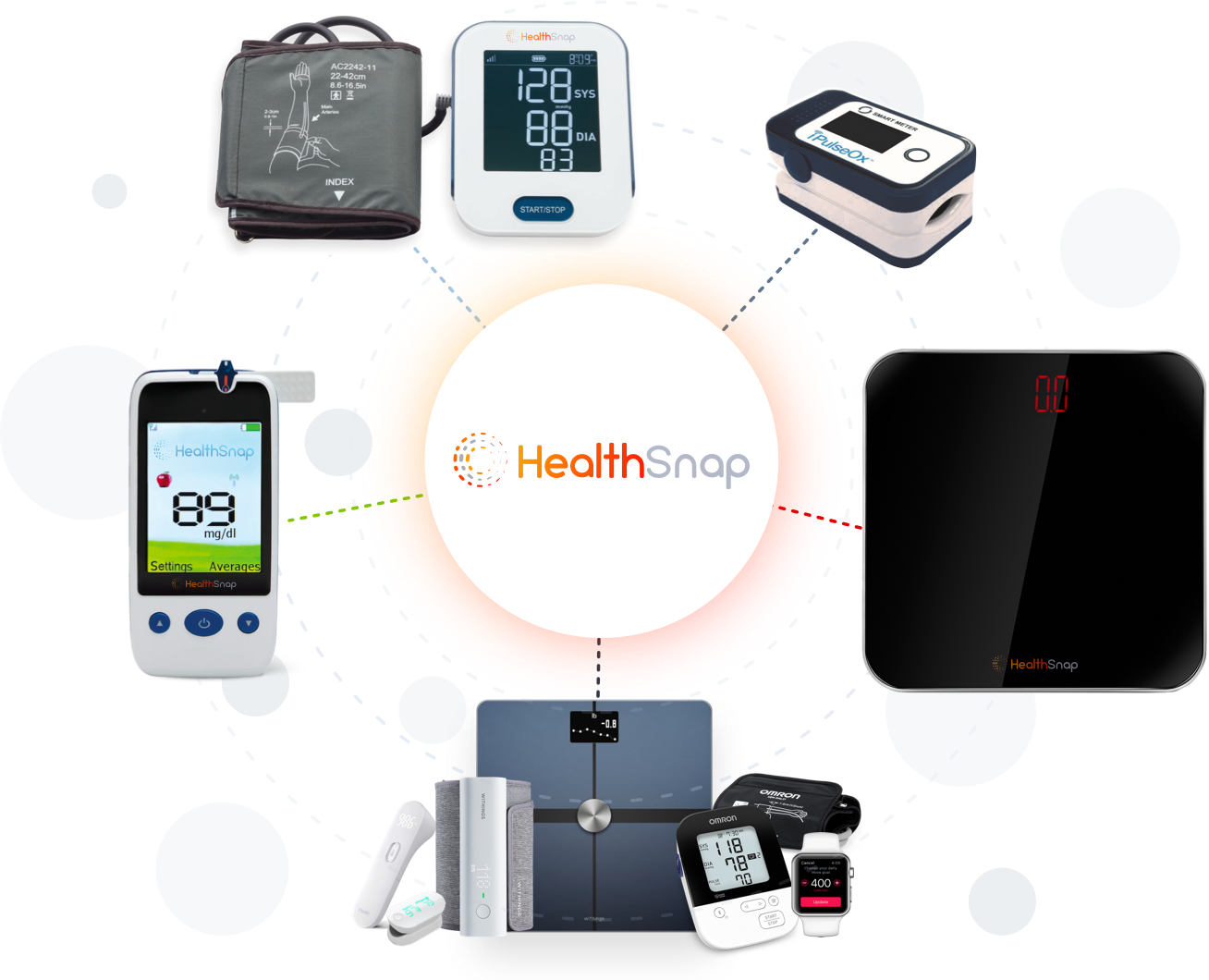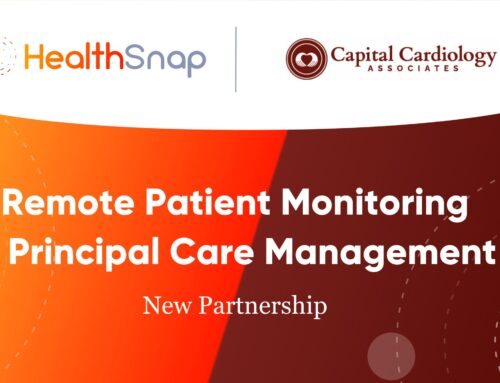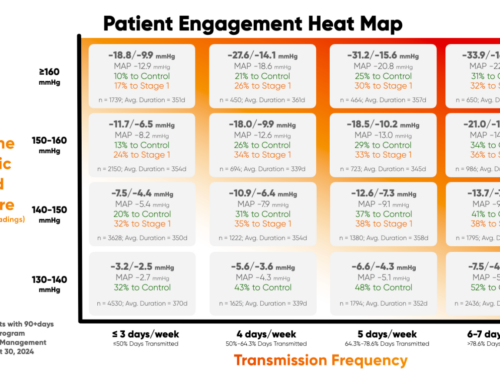As the first quarter of 2024 is underway, digital health solutions continue to evolve, led by transformative trends that promise to reshape healthcare delivery and improve patient outcomes. In this article, we’ve compiled the top 10 digital health trends that are expected to dominate the industry this year and beyond.
Convergence of Wearables and At-Home Devices
The synergy between wearables and at-home devices is set to enhance patient care, enabling healthcare professionals to meet patients where they are. The integration of virtual hospital wards and remote diagnostics, coupled with continuous monitoring through wearable devices, reduces the necessity for in-person hospital visits. This trend empowers patients, offering them greater autonomy in managing their care and fostering dynamic engagement with providers, specialists, and care coordinators.
GenAI’s Growing Role Across Healthcare
GenAI, the amalgamation of genetics and artificial intelligence, is set to play an increasingly pivotal role in various facets of healthcare. From drug development to consumer billing and cost improvement, GenAI’s impact is poised to be transformational. Its ability to process unstructured data and contribute to diverse areas within the healthcare industry positions it as a key player in the next phase of digital evolution, heralding what experts now refer to as “the AI era.”

Women’s Health Takes Center Stage
Data-driven companies are poised to lead the way in women’s health, offering integrated, end-to-end care pathways. The emergence of FemTech, characterized by innovative digital solutions, is anticipated to play a pivotal role in advancing women’s healthcare. The sector is witnessing significant attention, investment, and innovation, ensuring a more personalized and comprehensive approach to women’s health.
Mental Health and Well-Being Solutions
Acknowledging the critical importance of mental health, healthcare professionals are increasingly turning to digital tools to bridge care gaps, expand access, and offer personalized treatment. Specialized mental health and well-being solutions are expected to emerge, providing individuals with more options for care. This digital transformation aims to eliminate geographic barriers, making mental health services more accessible and personalized to individual needs.
Nutritional Interventions in Healthcare
The idea of using food as medicine is gaining momentum. Digitally-delivered nutritional recommendations are expanding beyond niche use cases to prevent and treat various conditions, from cancer to mental health disorders. Retailers are expected to invest significantly in medical nutrition innovations, leveraging legislation and reimbursement pathways to support these offerings. This trend signifies a paradigm shift towards holistic approaches to healthcare that incorporate nutrition as a vital component.
Digital Obesity Care and Personalization
The innovation maturity score for digital obesity care is on the rise, with a focus on remote monitoring, lifestyle coaching, and mental health support. As obesity care models evolve, personalization becomes a key differentiator. Solutions addressing the root causes of obesity and providing tailored interventions are anticipated to gain traction. Overcoming challenges related to supply chain, cost, and accessibility will be essential for the successful implementation of these obesity care models.
Caregiver-Focused Innovations
The emergence of caregiver-specific innovations is set to transform the digital health landscape. Solutions catering to caregivers of aging loved ones, parents, and individuals experiencing illness or disability are gaining momentum. With a growing economic value of family and unpaid caregiving, employers and consumers are expected to invest in administrative caregiver solutions. Startups supporting various caregiver responsibilities, including care delivery and mental health challenges, are likely to see increased demand.
Maturation of Retailers as Healthcare Providers
Big box retailers are solidifying their positions as healthcare providers, expanding beyond primary and urgent care. The maturation of care models within retail settings includes a focus on chronic disease management. Retailers are expected to invest in triage and care navigation solutions, aiming to reduce friction in handoffs between retail and traditional providers. The expansion of omnichannel services signals a concerted effort to enhance convenience and accessibility in healthcare delivery.
AGI’s Advancements in Healthcare
While Generative AI’s prominence in healthcare is evident, with significant funding and a surge in partnerships, future trends point towards the increasing role of Artificial General Intelligence (AGI) in healthcare. The journey towards embedding AGI-enabled solutions at scale in healthcare has already begun. Regulatory considerations, ethical concerns, and transparency issues related to non-diverse datasets remain critical. As the FDA continues to increase approvals for AI/ML technologies, healthcare system and companies must navigate algorithm bias and define robust AGI governance strategies.
Accelerating Data Interoperability
Data interoperability remains a longstanding priority in digital health, with a focus on compliance and taking advantage of data-sharing regulations. Interoperability solutions are expected to differentiate themselves through accuracy, depth of information, security, and usability. As more powerful data analytics tools become available, solutions with built-in analytics and insights capabilities are likely to stand out. The challenge for providers and payers is to upgrade internal data and electronic health record infrastructure and collaborate with interoperability solutions that support advanced analytics.

How RPM and CCM Technologies are Set to Accelerate These Trends
Remote Patient Monitoring (RPM) and Chronic Care Management (CCM) technologies are poised to play a pivotal role in accelerating the trends in the digital health arena for 2024. These technologies leverage digital tools to enhance patient care, improve outcomes, and increase efficiency in healthcare delivery. Here’s how RPM and CCM are set to propel the identified trends:
Convergence of Devices
-
Enhanced Monitoring: RPM technologies will facilitate continuous monitoring of patients through wearables, ensuring near real-time data on vital signs and chronic health condition metrics.
-
Increased Patient Engagement: Patients equipped with RPM devices will actively participate in their care, fostering a dynamic relationship with healthcare providers.

GenAI’s Growing Role
-
Data Integration: RPM and CCM technologies will contribute to the integration of GenAI into patient care, ensuring seamless utilization of AI in diagnostics, treatment planning, and personalized medicine.
-
Improved Decision Support: GenAI algorithms embedded in these technologies will provide healthcare professionals with enhanced decision support for advanced and primary care models.
Focus on Women’s Health
-
Personalized Care Plans: CCM platforms will allow for the creation of personalized care plans for women’s health, ensuring comprehensive and integrated care pathways.
-
Data-Driven Insights: RPM technologies will provide valuable data on women’s health parameters, aiding in data-driven decision-making for health systems.
Mental Health Solutions
-
Remote Mental Health Monitoring: RPM tools will enable remote monitoring of mental health indicators, allowing for timely interventions and personalized treatment plans.
-
Therapeutic Support: CCM technologies can integrate mental health support into chronic care management programs, addressing both physical and mental well-being.

Nutritional Interventions
-
Nutrition Monitoring: RPM tools can incorporate features for monitoring nutritional habits, providing insights that can be utilized in food-as-medicine interventions.
-
Personalized Dietary Plans: CCM platforms can integrate nutritional recommendations into personalized care plans, aligning with the trend of using food as medicine.
Digital Obesity Care
-
Lifestyle Monitoring: RPM technologies can monitor lifestyle factors contributing to obesity, facilitating a more holistic approach to digital obesity care.
-
Behavioral Interventions: CCM technologies can include behavioral interventions customized to individual needs, promoting sustainable weight management.
Retailers as Healthcare Providers
-
Remote Consultations: RPM technologies and telehealth services can enable remote consultations, extending the reach of retailers as healthcare providers beyond physical clinics.
-
Integrated Care Pathways: CCM platforms can support retailers in offering integrated care pathways, seamlessly coordinating patient care across various settings.
AGI’s Advancements
-
Data Processing and Analysis: RPM technologies equipped with AI/ML capabilities can process and analyze vast amounts of patient data in near real-time, contributing to AGI’s role in healthcare.
-
Governance in CCM: Chronic care management programs will establish robust AI/ML governance strategies, addressing ethical concerns and ensuring transparent use of AGI technologies.
Accelerating Data Interoperability
-
Unified Patient Records: RPM and CCM technologies will contribute to the creation of unified patient records, fostering interoperability and data exchange among different healthcare systems.
-
Advanced Analytics: These technologies will support advanced analytics within interoperability solutions, ensuring the accuracy and usefulness of shared healthcare data.
Stay Ahead of the Digital Healthcare Trends Curve with HealthSnap
RPM and CCM technologies will serve as catalysts in advancing digital health trends now and in years to come, offering solutions that enhance patient care, optimize healthcare delivery, and contribute to the overall growth of the healthcare industry.
HealthSnap’s integrated, HIPAA-compliant Virtual Care Management Platform transforms the patient experience, allowing for continuous, proactive, and remote care, which enables better health outcomes. Give us a call at 888-780-1872 (Ext. 3) or contact us online to schedule a free demo of our RPM and CCM programs.












Leave A Comment
You must be logged in to post a comment.